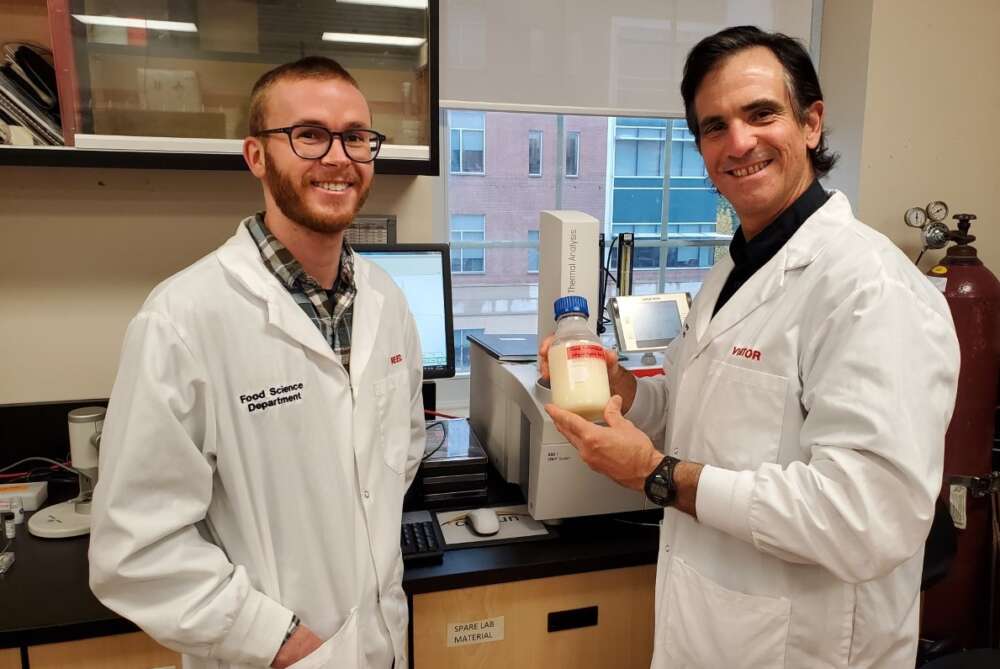
University of Guelph food scientists have made a discovery that could lead to a healthier, more affordable and more sustainable substitute for palm oil.
Published in Nature Food, this study is the first to demonstrate the use of enzymatic glycerolysis (EG) for turning liquid vegetable oils into solid fats – a critical transformation behind a range of widely consumed foods but one that until now has meant trading off health and environmental benefits.
The research was featured in the Toronto Star.
Already employed to make food ingredients, EG uses enzymes to break down fats into smaller units. Testing cottonseed and peanut oils to make margarine and peanut butter, Prof. Alejandro Marangoni and PhD student Reed Nicholson were able to produce solid fats with textural and structural properties desired by consumers.
“This innovation may revolutionize production of numerous foods from baked goods to increasingly popular plant-based meat alternatives while offering a heart-healthy improvement over the use of saturated fats,” said Marangoni.
When cardiovascular health concerns surfaced in the 1990s about partially hydrogenated oils containing harmful trans fats, food companies looked for substitutes.
Palm oil was an obvious alternative, with its “sweet spot” property of remaining solid at room temperature. But that trait stems from its high saturated fat content, which also increases the risk of coronary heart disease.
Palm oil production also poses an environmental problem. Since the 1980s, large-scale production has exploded in the tropics, especially in Southeast Asia. Cutting down millions of hectares of tropical forests and replacing them with palm oil plantations has destroyed habitat for numerous species, threatening biodiversity.
Other potential substitutes such as coconut oil are more costly, limited in supply and high in saturated fats.
“There’s a lot of activity trying to find appropriate substitutes for those products,” said Marangoni, holder of the Canada Research Chair in Health, Food and Aging. “There’s no economically available solid fat left to fulfill the ethical and health requirements. How to turn oil into solid fat to meet those requirements?”
Referring to the U of G discovery, he added, “This process could fill that role extremely well.”
This simple method may appeal to food producers of all sizes anywhere in the world, said Marangoni. Noting that the new process would need regulatory approval for use, he added, “This is relatively easy to scale up. It’s amenable to smaller food production or even local food production.”
This finding will enable food producers to use all sorts of readily available vegetable oils that can be produced in parts of the world that are not necessarily tropical regions, said Nicholson.
“These oil crops can be grown in areas with lower levels of biodiversity, so they have not as big an impact on the environment and the habitats of animals living in tropical regions.”
While palm oil will still be produced and used worldwide, the two researchers believe this U of G study may point a way to help slow the destruction of ecosystems and animal habitats.
“Both the sustainability and health sides are important,” said Nicholson.
The researchers received funding from the Natural Sciences and Engineering Research Council of Canada, the Canada Research Chairs program, the Government of Ontario and the Barrett Foundation.
Contact:
Prof. Alejandro Marangoni
amarango@uoguelph.ca
As Canada’s food university, the University of Guelph is shining a light on all the ways we are supporting and improving Canada’s food systems in celebration of Food Day Canada on July 31. Visit U of G’s Food Day Canada page to learn more.